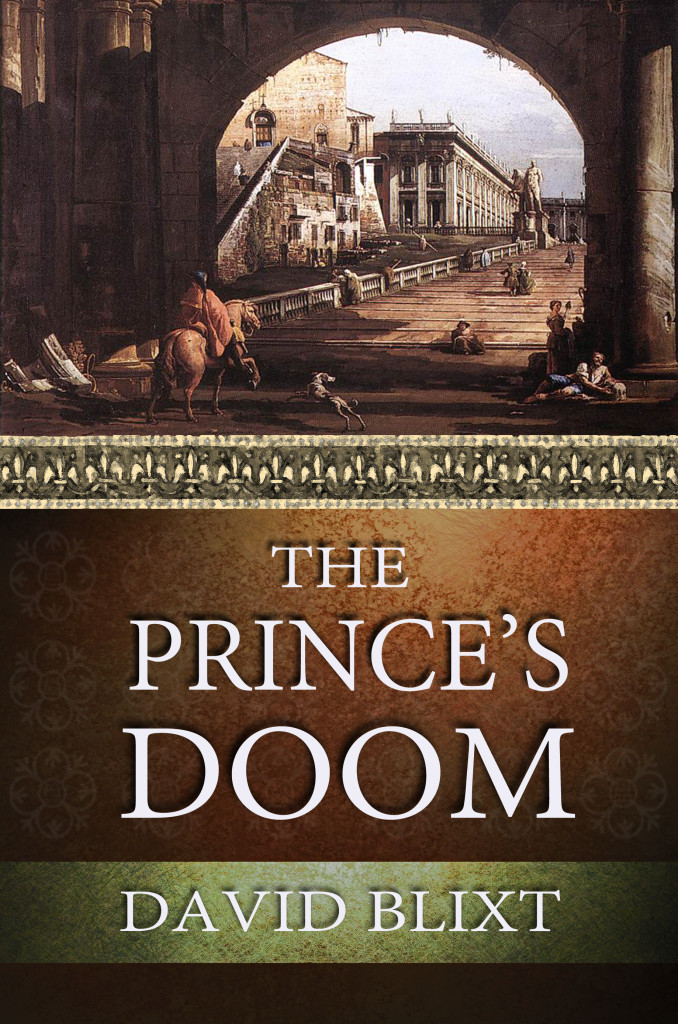The Vatican Princess: A Novel of Lucrezia Borgia by C.W. Gortner
Publication Date: February 9, 2016
Ballantine Books
Hardcover, Ebook, Audiobook
400 Pages
Genre: Historical Fiction

Infamy is no accident. It is a poison in our blood. It is the price of being a Borgia.
Glamorous and predatory, the Borgias fascinated and terrorized 15th-century Renaissance Italy. Lucrezia Borgia, beloved daughter of the pope, was at the center of the dynasty’s ambitions. Slandered as a heartless seductress who lured men to their doom, was she in fact the villainess of legend, or was she trapped in a familial web, forced to choose between loyalty and survival?
With the ascension of the Spaniard Rodrigo Borgia as Pope Alexander VI, the new pope’s illegitimate children—his rival sons, Cesare and Juan, and beautiful young daughter Lucrezia—assume an exalted position in the papal court. Privileged and adored, Lucrezia yearns to escape her childhood and play a part in her family’s fortunes. But Rome is seductive and dangerous: Alliances shift at a moment’s notice as Italy’s ruling dynasties strive to keep rivals at bay. As Lucrezia’s father faces challenges from all sides, he’s obliged to marry her off to a powerful adversary. But when she discovers the brutal truth behind her alliance, Lucrezia is plunged into a perilous gambit that will require all her wits, cunning, and guile. Escaping her marriage offers the chance of happiness with a passionate prince of Naples, yet as scandalous accusations of murder and incest build against her, menacing those she loves, Lucrezia must risk everything to overcome the lethal fate imposed upon her by her Borgia blood.
Beautifully wrought, rich with fascinating historical detail, The Vatican Princess is the first novel to describe Lucrezia’s coming-of-age in her own voice—a dramatic, vivid tale set in an era of savagery and unparalleled splendor, where enemies and allies can be one and the same, and where loyalty to family can ultimately be a curse.
“Assiduously researched and expertly crafted . . . . This unholy plunge into Rome’s darkest dynasty is wholly engrossing.” – Allison Pataki, New York Times bestselling author
“A spider web of Renaissance intrigue with a legendary cast . . . Impressive research, a lush background, and deft characterization make for a fascinating read.” – Margaret George, New York Times bestselling author
“Elegantly written and deeply researched . . . Renaissance Italy is vividly brought to life. I’m captivated by this knowledgeable author’s take on the controversial Borgias.” – Alison Weir, NYT bestselling author
About the Author
C.W. GORTNER holds an MFA in Writing with an emphasis in Renaissance Studies from the New College of California, as well as an AA from the Fashion Institute of Design and Merchandising in San Francisco.
After an eleven year-long career in fashion, during which he worked as a vintage retail buyer, freelance publicist, and fashion show coordinator, C.W. devoted the next twelve years to the public health sector. In 2012, he became a full-time writer following the international success of his novels.
In his extensive travels to research his books, he has danced a galliard at Hampton Court, learned about organic gardening at Chenoceaux, and spent a chilly night in a ruined Spanish castle. His books have garnered widespread acclaim and been translated into twenty-one languages to date, with over 400,000 copies sold. A sought-after public speaker. C.W. has given keynote addresses at writer conferences in the US and abroad. He is also a dedicated advocate for animal rights, in particular companion animal rescue to reduce shelter overcrowding.
Half-Spanish by birth and raised in southern Spain, C.W. now lives in Northern California with his partner and two very spoiled rescue cats.
For more information visit C.W. Gortner’s website and blog. You can also find him on Facebook, Twittter, Goodreads,Pinterest, and YouTube. Sign up for C.W. Gortner’s Newsletter for updates.
Book Blast Schedule
Tuesday, February 9
Unshelfish
Drey’s Library
The Maiden’s Court
CelticLady’s Reviews
Wednesday, February 10
The Lit Bitch
The Never-Ending Book
A Dream within a Dream
What Is That Book About
Thursday, February 11
Laura’s Interests
The Reader’s Hollow
Flashlight Commentary
Friday, February 12
Let Them Read Books
To Read, Or Not to Read
Saturday, February 13
So Many Books, So Little Time
Eclectic Ramblings of Author Heather Osborne
Sunday, February 14
100 Pages a Day
With Her Nose Stuck In A Book
Monday, February 15
A Book Geek
A Bookish Affair
Puddletown Reviews
Tuesday, February 16
Just One More Chapter
Historical Fiction Obsession
Teddy Rose Book Reviews Plus More
Wednesday, February 17
Impressions In Ink
A Literary Vacation
The Country Bookworm
Thursday, February 18
The True Book Addict
Ageless Pages Reviews
Friday, February 19
Passages to the Past
Kristin Un-Ravelle’d
Book Lovers Paradise
Saturday, February 20
Beth’s Book Nook Blog
One Book Shy of a Full Shelf
Sunday, February 21
Carpe Librum (Seize The Book)
Seize the Words: Books in Review
Monday, February 22
Broken Teepee
Book Drunkard
The Reading Queen
Tuesday, February 23
Teatime and Books
View from the Birdhouse
Historical Fiction Connection
Giveaway
To win a Borgia-Inspired Velvet Bag & Beaded Bracelet from C.W. Gortner please enter the giveaway via the GLEAM form below.
Rules
– Giveaway ends at 11:59pm EST on February 23rd. You must be 18 or older to enter.
– Giveaway is open to US residents only.
– Only one entry per household.
– All giveaway entrants agree to be honest and not cheat the systems; any suspect of fraud is decided upon by blog/site owner and the sponsor, and entrants may be disqualified at our discretion
– Winner has 48 hours to claim prize or new winner is chosen.
The Vatican Princess Book Blast
To win a Borgia-Inspired Velvet Bag & Beaded Bracelet from C.W. Gortner please enter the giveaway via the GLEAM form below.
Rules
– Giveaway ends at 11:59pm EST on February 23rd. You must be 18 or older to enter.
– Giveaway is open to US residents only.
– Only one entry per household.
– All giveaway entrants agree to be honest and not cheat the systems; any suspect of fraud is decided upon by blog/site owner and the sponsor, and entrants may be disqualified at our discretion
– Winner has 48 hours to claim prize or new winner is chosen.
The Vatican Princess Book Blast
















